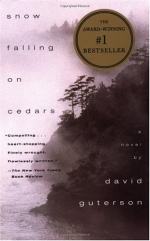|
|
Snow Falling on Cedars Author/Context
David Guterson was born in Seattle in 1956. He earned a Master's Degree from University of Washington. He has written two other novels, "East of the Mountains,"and "Our Lady of the Forest," a book of short stories, "The Country Ahead of Us, the Country Behind," and a nonfiction book entitled, "Family Matters: Why Homeschooling Makes Sense." (Guterson and his wife homeschooled all four of their children.) His stories mainly take place in the Pacific Northwest. He is a contributing editor to Harper's Magazine, and has written for Sports Illustrated. He lives in Puget Sound with his wife and children. For a time, he taught high school English. "Snow Falling on Cedars won the PEN/Faulkner Award in 1995. This illustrious award has been given to many of America's most admired writers. The novel's success allowed him to quit teaching and write full time. He claims that writing and being with his family are what fulfill him.
Guterson studied under Charles Johnson, author of "Middle Passage." Guterson is the son of Murray Guterson, a lawyer who instilled in his son the desire to do right and make his mark on the world. "One of the things I heard [from him] early on was to find something you love to do--before you think about money or anything else. The other thing was to do something that you feel has a positive impact on the world." Although he does not think writers should give their readers easy answers to moral questions, Guterson believes it is important that the questions be posed. He respects Chekhov and Jane Austen for their style, and is preoccupied with what he calls "human needs." He says, " I'm interested in themes that endure from generation to generation. Fiction is socially meaningful. Every culture is sustained by certain central myths. At its heart, fiction's role is to see these roles and myths are sustained." He argues that living for a long time in a place such as the Pacific Northwest, as he does, allows him to see those myths and explore them. He writes as a native, with a deep love of the landscape and people. He thoroughly researched the history of the Japanese internment camps he writes about in the novel, speaking with many Japanese people from the towns near where he lives. He has done this for his most recent book, Our Lady of the Forest, as well: the book's focus is the Catholic faith, and the book demonstrates his knowledge about the subject. Some reviewers have objected to his display of that knowledge: they argue that his characters are mouthpieces for his own views, and are thus less than believable. Additionally, he is criticized for overuse of complex words and syntax. However, many reviewers agree that his descriptive writing is forceful and skilled.
In Snow Falling on Cedars, Guterson wanted to write about commonplace tragedy, about the way accidents can affect people's lives tremendously. He sees this as part of his writing and his way of life. He enjoys the vast, unyielding power of nature much more than the bustle of city life and civilization. He searches for the calm his character Hatsue feels in the novel, and thinks of himself as a happy person when he is able to achieve that calm.
Bibliography
Guterson, David. Snow Falling on Cedars. New York: Vintage, 1995.
Kanner, Ellen. Bookpage Review, 1996. http://www.bookpage.com/9601bp/fiction/snowfallingoncedars.html
Ratliff, Ben. "What Good Is a Miracle Without Savvy Publicity?" New York Times, 04-09-99, Sec. E, Pg. 47.




